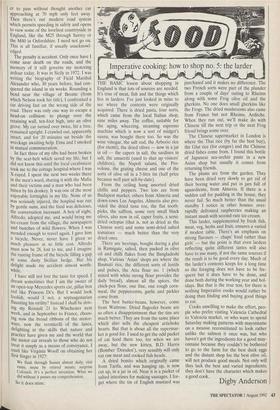Imperative cooking: how
to shop no. 5: the larder iptk jolkaAlk, _AL THE BASIC lesson about shopping in England is that lots of sources are needed. It's true of meat, fish and the things which live in larders. I've just looked in mine to see where the contents were originally acquired. There is dried pasta, four sorts, which came from the local Italian shop, nine miles away. The coffee, suitable for the aging, wheezing, steaming espresso machine which is now a sort of midget's sauna, was bought there too. So was the wine vinegar, the salt cod, the Arborio rice (for risotti), the dried olives — now in a jar in oil — the capers in salt, the sardines in salt, the amaretti (used to shut up visitors' children), the Napoli salami, the Pro- volone, the grating cheese and one of the sorts of olive oil in a 5-litre tin (half price because well past sell-by-date).
From the ceiling hang assorted dried chillis and peppers. Two lots are from Budapest market, others from Almeria and down-town Los Angeles. Almeria also pro- vided the dried tuna roe, the flat tooth- picks, the saffron, some very small black olives, also now in oil, caper fruits, a semi- dried octopus (that is, not as dried as the Chinese sort) and some semi-dried salted tomatoes — much better than the very dried ones.
There are herrings, bought during a glut in Ramsgate, salted, then packed in olive oil and chilli flakes from the Bangladeshi shop. Various 'Asian' shops are where the Basmati rice, the different sorts of lentils and pulses, the Atta flour no. 1 (which mixed with white strong flour provides the daily bread), almost all the spices, the chick-pea flour, one fine, one rough corn- meal, the peppercorns, garlic and pickles come from.
The best butter-beans, however, come from Waitrose. Dried flageolet beans are so often a disappointment that the tins are much better. They are from the same place which also sells the cheapest artichoke hearts. But that is about all the supermar- ket is good for. I used to get the odd packet of cat food there too, for when we are away, but the new kitten, B.D. Harris (Bomber 'Dresden), very sensibly will only eat raw meat and cooked fish-heads.
A dried bonito which originally came from Tarifa, and was hanging up, is now cut up, in a jar in oil. Near it is a packet of salted intestines for making sausages. I for- get where the tin of English mustard was
purchased and it makes no difference. The two French sorts were part of the plunder from a couple of days' outing to Rheims along with some Frog olive oil and the gherkins. No one does small gherkins like the Frogs. The dried mushrooms also came from France but not Rheims, Ardeche. When they run out, we'll make do with Chinese till the next trip or the next Frog friend brings some over.
The Chinese supermarket in London is where the Thai rice (by far the best buy), the Glut rice (for congee) and the Chinese dried fishes come from. I found this bottle of Japanese sea-urchin paste in a new Asian shop but usually it comes from returning friends.
The plums are from the garden. They have been dried very slowly to get rid of their boring water and put in jars full of aguardiente, from Almeria. If there is a sudden call for pudding in the house, they never fail. So much better than the usual standby I notice in other houses: over- rapidly defrosted raspberries making an instant mush with second-rate ice-cream. This larder, supplemented by fresh fish, meat, veg, herbs and fruit, ensures a varied if modest table. There's an emphasis on strong flavours — chaps' food rather than girls' — but the point is that even larders reflecting quite different tastes will also have to use many, if not the same sources if the result is to be good every day. Much of the larder's contents keeps for a long time so the foraging does not have to be fre- quent but it does have to be done, and done both during the working year and hol- idays. But that is the true test, for there is nothing Imperative cooks would rather be doing than finding and buying good things to Cooks t.
o
ks unwilling to make the effort, peo- ple who prefer visiting Valencia Cathedral to Valencia market, or who want to spend Saturday making patterns with mayonnaise on a mousse reconstituted to look rather unlike the salmon it once was, but who haven't got the ingredients for a good may- onnaise because they couldn't be bothered to go to the farm for the best duck eggs and the distant shop for the best olive oil, will not produce good meals. Not only will they lack the best and varied ingredients; they don't have the character which makes a good cook.
Digby Anderson


















































 Previous page
Previous page